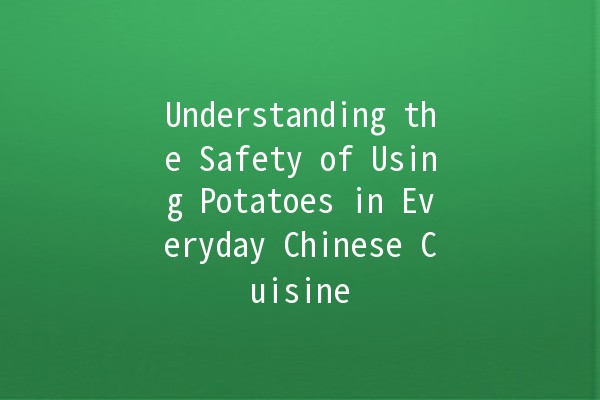The efficacy and safety of using potatoes in food preparation is a topic of considerable interest, particularly in the context of Chinese cuisine. Potatoes are versatile, nutritious, and easily accessible, making them a popular choice among many cooks. However, understanding their safe use – including handling, storage, and preparation techniques – is critical to ensure a healthy cooking environment.
Safe Handling of Potatoes
When selecting potatoes, look for firm ones without any bruises, cuts, or blemishes. Soft spots or green patches indicate that the potato is either overripe or has started to degrade. Green areas in potatoes can contain solanine, a natural toxin that can cause nausea and other health issues if consumed in large amounts. Always opt for potatoes that are free of such imperfections.
Application Example: When shopping for potatoes, check the entire bag or basket to discard any that may appear spoiled. If possible, buy organic potatoes to minimize pesticide exposure, as conventional methods often involve chemical treatments.
Before cooking, it is essential to wash potatoes thoroughly to remove dirt, pesticides, and any potential bacteria. Use a vegetable brush to scrub the skin under running water. This step is crucial, especially if you plan to eat the skin, which is nutrientrich.
Application Example: Incorporate washing potatoes into your cooking routine by creating a designated washing area in your kitchen with running water and a brush, encouraging others to engage in this safe practice.

Store potatoes in a cool, dry place away from direct sunlight to prevent them from sprouting or going bad. An ideal storage temperature is between 45°F and 50°F (7°C to 10°C). Do not store potatoes in the refrigerator, as cold temperatures can lead to undesirable changes in taste and texture.
Application Example: Invest in a breathable produce bag or a wooden crate for storing potatoes, ensuring they remain cool and dry.
Techniques for Safe Preparation
When peeling potatoes, use a sharp peeler to avoid accidents. Cut away any green spots before peeling to ensure that you consume only the safe parts. Always use a clean cutting board to prevent crosscontamination from other foods, especially raw meats.
Application Example: Set up a ‘clean zone’ in your kitchen with designated tools for vegetable preparation, emphasizing hygiene practices like regularly washing cutting boards and utensils.
Ensure that potatoes are cooked thoroughly to eliminate any bacteria present. Boiling, baking, roasting, or frying are all effective methods to prepare potatoes for consumption. Cooking at a high temperature not only enhances flavor but also contributes to safety by destroying harmful pathogens.
Application Example: Experiment with various cooking methods and find the one that enhances the flavor while ensuring food safety – for instance, baking potatoes with skins on can increase nutrient retention.
Common Questions about Potato Safety
Answer: It is advisable to avoid eating green potatoes, as the green color indicates the presence of solanine. If a potato is green, cut away the green parts or discard the potato entirely.
Answer: Store potatoes in a cool, dark place with good ventilation. Avoid storage in the refrigerator, which can alter their taste and texture.
Answer: Yes! Potatoes are a great source of vitamins and minerals, particularly Vitamin C, Vitamin B6, and potassium. They also provide dietary fiber, especially when consumed with the skin.
Answer: Signs include a softness to the touch, a foul odor, or an extensive amount of sprouting. If any of these indicators are present, it’s best to dispose of the potato.
Answer: There are numerous safe methods to cook potatoes, including boiling, roasting, frying, and baking. Ensure they reach a suitable internal temperature (at least 210°F/99°C) to guarantee safety.
Answer: While you can freeze potatoes, it's best to blanch them first to preserve quality and safety. Always cook frozen potatoes thoroughly before consumption.
Tips for Enhancing Cooking Productivity with Potatoes
Instead of cooking potatoes individually, consider batch cooking them. Prepare larger quantities and store them for later use in various recipes, which can cut down cooking time during busy weeknights.
Application Example: Boil a large pot of potatoes, mash some for immediate use, and dice others to use in salads or stirfries throughout the week.
Repurposing leftover potatoes can be a great way to minimize waste and maximize productivity. Leftover mashed potatoes can be used to make potato pancakes or added to soups for thickness.
Application Example: Share a recipe or create a guide on how to use leftover potatoes creatively, encouraging sustainable cooking habits.
Explore different potato varieties, as each type offers unique flavors and textures. From waxy Yukon Gold to starchy Russets, using a mix can enhance your dishes.
Application Example: Host a potato tasting session at home to find out which types your family members prefer, influencing future grocery shopping.
Season potatoes as they cook to enhance their flavor. Whether boiling, roasting, or mashing, adding herbs or spices during cooking can greatly boost the overall taste of your dishes.
Application Example: Create a spice mix specifically for potatoes that includes garlic powder, rosemary, and paprika, and keep it handy for quick seasoning.
Getting children involved in cooking can make preparation fun and educational. Simple tasks such as washing or peeling potatoes can teach them cooking basics.
Application Example: Plan a family night where you all learn together to make a potato dish, building bonds and imparting useful kitchen skills in children.
By focusing on these practical tips for the safe use of potatoes, you can ensure a healthy cooking experience while enjoying the culinary versatility that potatoes bring to your kitchen. Embrace the joy of cooking with potatoes while maintaining safety at every step! 🥔🍽️